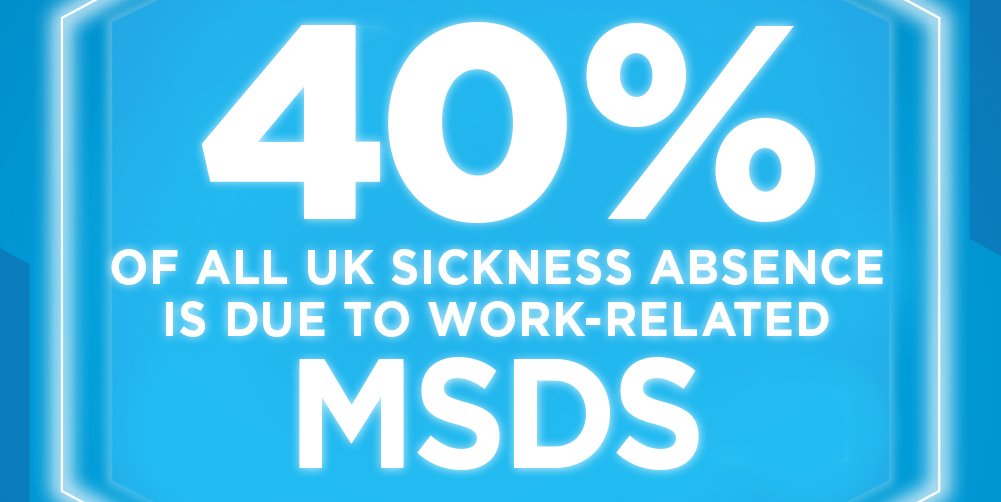Physiotherapy enables people to stay in or return to work.
Information paper for CSP members:
Good work - that is, work within the capability of the person doing it - is linked to health.
Work can bring both mental and physical health benefits, and so being in work is a key determinant of health. Most people need to work and socioeconomic success is also a factor in life expectancy.
The UK population is living longer and there is an associated rise in the government pension age. As we age, most people will develop long-term health conditions that they will need to manage whilst working. The workplace now needs to support people so that their ability to contribute is sustainable.
Size of the task
- Sickness absence from work currently costs the UK £14.3 billion
- 40% of all UK sickness absence is due to work-related MSDs
- Working days lost due to work-related MSDs = 9.5 million
- Working days lost due to work-related stress = 9.9 million
The UK challenge: health, work and austerity

At a time when the NHS is serving a growing and ageing population, the UK government estimates the need for £22 billion in NHS savings by 2020/21(3). Yet public expectation remains that access to ever improving treatment should be available to all. So the drive to reduce the welfare bill and to have people in productive work remains a government priority. There is clearly a pressing need for best value and productivity in healthcare.
Musculoskeletal disorders (MSDs), from short term back pain to complex, long term conditions such as rheumatoid arthritis, are the main reason for people being off work. These conditions can also link to mental health conditions such as anxiety and depression, which are
Are you a CSP member? Please tell us how we can improve these briefings. Just login and complete our pop-up survey
associated with stress and are responsible for the most working days lost in the UK. Psychosocial factors such as workplace culture can in turn impact on the development of MSDs.
Benefits of early referral to physiotherapy for work
- Economic savings to the UK
- Prevention of MSDs and work-related exacerbation of other conditions
- Clinical effectiveness in the treatment of MSDs and other conditions affecting workers
- High levels of staff satisfaction
- 'Healthy conversations' that support behaviour change
Early access to physiotherapy enables people to work
Physiotherapy can help. It is a regulated, clinically and economically cost-effective profession.
Physiotherapists are autonomous practitioners, with the skills to accept referrals directly.
They assess, diagnose, advise and treat people in many clinical and non-clinical settings, both inside and outside of the NHS. They are experts in the prevention and treatment of MSDs and of other conditions affecting people of working age, such as cancer, cardiac, respiratory and neurological conditions.
According to Macmillan, there are currently over 750,000 people of working age living with cancer and it is predicted that there will be 17million people living with arthritis and 3 million with cancer by 2030.
Work advice from physiotherapists

All physiotherapists can give advice to help people to prevent problems related to their work. They advise employees, enabling conversations with line managers, and liaise with other health care professionals, family and carers as needed. Where a problem or health condition already exists they work with people to achieve optimal function and mobility - with work an important treatment outcome.
Physiotherapists add further value in supporting the public’s overall health. For instance, they can give specific advice about physical activity levels based on an individual’s clinical physiotherapy assessment. This can help people address concerns such as obesity, leading them to better overall health and promoting self-management of their condition.
Within the workplace, physiotherapists specialising in occupational health and ergonomics can provide targeted support in response to the needs of staff and their roles, as well as the business needs of employers. They liaise with line managers and others to promote workplace health and minimise sickness absence.
The NHS itself, the UK’s largest employer, has a high rate of sickness absence due to MSDs, costing around £400m per year. Early access to physiotherapy is now included in government measures. For instance, as part of the work generated by the Five Year Forward View aimed at reducing sickness absence in NHS workers
Case studies

41,000 working days saved
John Lewis partners (staff) reporting an injury receive a triage call from Physio Med within four hours, and initial assessment from a chartered physiotherapist within three days. 2,324 partners engaged with the service over 12 months. JLP estimates it saved 41,010 working days, saving £2,676,000
93% improvement
The Royal Free London NHS Trust provides a physio-led health and work centre for staff with self-referral to physiotherapy, workplace and ergonomic assessments and health and wellbeing advice. 89% were recommended fit to stay or return to work; data shows 93% improvement in spinal, upper and lower limb disorders.
Worst to best
NHS Lanarkshire put in place a ‘self-referral to support’ service, including physiotherapy, from day one of sickness absence. They moved from being the worst, to among the best performing Health Boards in mainland Scotland.
Increased confidence for managers
79% of staff using the Physio Plus self-referral physiotherapy service at Sheffield NHS Hospitals Trust report it prevented them having to take time off work. 69% of those off work said it helped them return more quickly. Staff and managers said it increased their confidence in dealing with sickness absence.
High return on investment
100 London Fire Brigade staff with chronic musculoskeletal conditions followed a programme provided by Crystal Palace Physio Group including work-specific exercises. There was an 85% reduction in time off work, and £27 return on every £1 spent.
Staff self-referral
Powys physiotherapy service responded to data from the health and wellbeing team demonstrating MSK conditions were in the top three reasons for sickness absence at Powys Teaching Health Board. Staff now fast-track themselves into the service for assessment, self-help advice and management of their condition.
Summary
Referral to physiotherapy can help people to work. For those already in work, physiotherapists can help to prevent sickness absence in the first place, and facilitate sustainable return to work following sickness absence. For those not working, physiotherapy can enable individuals to take opportunities to work. Early access to physiotherapy benefits individuals, workplaces and the economy.
Download a PDF of the briefing, with full references, in English or Welsh below.